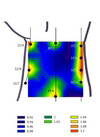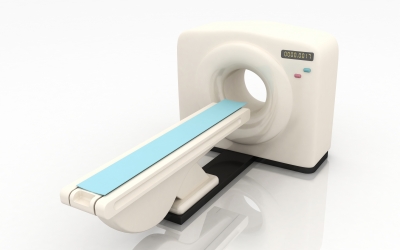How freakin' cool is it that 5000 years ago the ancient Chinese knew that there was something special about certain parts of the body and that these points could be used to restore health? How did they figure it out? I am loving that science is finally figuring out ways to look at our bodies to see what the ancients somehow knew so long ago!
|
A new study has been published that used CT scans to reveal differences between acupuncture points and non-acupuncture points. Click here to read more about it!
How freakin' cool is it that 5000 years ago the ancient Chinese knew that there was something special about certain parts of the body and that these points could be used to restore health? How did they figure it out? I am loving that science is finally figuring out ways to look at our bodies to see what the ancients somehow knew so long ago!
1 Comment
A new study shows that the herb Corydalis (known as Yan Hu Suo in Chinese medicine) is effective at decreasing pain. Especially long-term, low level chronic pain.
There's a reason my teachers called this herb the Tylenol of Chinese medicine! Now, just imagine how effective it is when it's used in a pain-relieving Chinese herbal formula that's been formulated just for you and the specifics of your pain!  Image: FreeDigitalPhotos.net This study showed that the acupuncture point called An Mian (which translates to Peaceful Sleep) improves our deep sleep. This point is an absolute must if you're struggling with sleeping - trouble falling to sleep, staying asleep or waking feeling rested. What's amazing is that they found that this point worked all by itself! Now, just imagine if they used this point in conjunction with other points that promote sleep! If you struggle with sleep, acupuncture and Chinese herbal medicine could be just what you need! Schedule your appointment today by calling me at (971) 285-4825 or scheduling online!  Okay, I'm going to geek out for a minute here. This is so freakin' neat! Scientists have found that Oxygen levels are higher at acupoints. Using an oxygen sensor, they made the picture to the left. It's really small, so a bit difficult to read, but the yellow/orange/red areas are the areas of increased oxygen levels. Those areas are the acupuncture points of the forearm! I can't wait until scientists examine the entire body in this fashion! Plus, it makes for really pretty art. You can bet that a full-body scan would be hung on the wall at my office! This study took patients who'd come to a dead end in biomedical treatments without getting full relief from their chronic sinus pain and treated them with many components of Chinese medicine (acupuncture, acupressure, diet changes and exercises).
Most of the patients got at least some relief from their symptoms which is great! However, I wonder how much better the patients may have gotten if individualized herbal formulas had been prescribed? In China, herbal medicine is actually the more popular treatment method and is used right along side biomedicine! If you've been reading this blog for any amount of time, you've heard me discuss the difficulties with doing placebo-controlled research on acupuncture. Here's one such post.
I came across this article today which very beautifully describes some of the issues that arise when we try to put acupuncture into the standard biomedical model of research. It also explains how studies designed to test acupuncture against standard biomedical care show the reality - acupuncture is a viable treatment method that can compete against medications without the side effects! It's about time that there's finally proof of what we acupuncturists already know - This medicine is a fine art, not one that can be learned in a mere 300 hours, and those attempting to practice acupuncture with so little working-knowledge of the system create dangerous situations for their patients.
Anyone practicing acupuncture should be required to complete a minimum number of hours of hands-on training as well as pass the same rigorous testing that licensed acupuncturists complete. This is a matter of patient safety. Press-Release - Wednesday, May 5, 2010- Acupuncture patients may suffer from unwanted side effects in the hands of non-licensed acupuncturists, according to a comprehensive study conducted by the Institute of Community Medicine in Norway. Acupuncture has been proven to be an effective form of therapy. Numerous scientific studies have proven the efficacy of acupuncture on treating various ailments. As a testament to the now scientifically recognized value of acupuncture, the Department of Essential Drugs and Medicine Policy of the World Health Organization (WHO) has published a list of diseases, symptoms, and conditions that acupuncture can treat. Headaches, depression, sprains, strokes, sciatica, and rheumatoid arthritis are among the conditions included in WHO’s 2003 publication. However, practitioners with minimal acupuncture training, such as Chiropractors and Medical Doctors who have logged about 300 hours of practice while attending several weekend acupuncture seminars, may pose a risk to patients seeking acupuncture therapy. A comprehensive decade long study of Norway’s Institute of Community Medicine validates the fact that acupuncture is not safe at the hands of untrained individuals. During the 14-year study, the institute have discovered that 193 patients have suffered from adverse side-effects. The bulk of the said patients may have consulted non-licensed acupuncturists. The study also found out that Medical Acupuncture treatment performed by doctors with minimal acupuncture training was the reason for the death of three patients as also reported by http://www.medicalacupuncturefacts.com. The most serious side-effect that may stem from consulting non-licensed acupuncturists is pneumothorax or the influx of unwanted air in the chest due to perforation of the lungs by incorrect needle insertion. One case involved a patient who died 90 minutes after suffering chest pains and dyspnea after medical acupuncture treatment, according to MEDLINE. Like other fields of conventional Western Medicine, acupuncture should be performed by a Licensed Acupuncturist (L.Ac.) only. Qualification for an acupuncture license is rigid. It is required that graduate acupuncture students should have more than 3,000 credit hours of study and training before gaining a license. During training, students are required to master the human body and the various acupuncture points. Such extensive training would ensure the absolute safety of patients who seek the services of an L.Ac. Unwanted accidents, such as perforation of the lungs by an acupuncture needle, would not happen at the hands of an L.Ac. who knows by heart all insertion points in the body. When it comes to seeking treatment, your well-being should be your top priority. To ensure your safety, it is advisable to only consult an L.Ac. who has graduated from accredited acupuncture schools from The Accreditation Commission for Acupuncture and Oriental Medicinehttp://www.acaom.org/accprgs.asp. About Medical Acupuncture Facts: Medical acupuncture facts discusses the importance of seeking out a licensed acupuncturist over a doctor or chiropractor with minimal medical acupuncture training. For over 2 years Medical Acupuncture Facts has been informing the public of the dangers of going to non-licensed acupuncturists and shows common sense reasons of why to stick with licensed acupuncturists to ensure public safety. Visit http://www.medicalacupuncturefacts.com to learn more. # # # Company Name: Medical Acupucture facts A recent study on acupuncture as a treatment for depression during pregnancy finds that acupuncture shows some real promise for being a safe and effective treatment during a time when most treatments are not considered safe.
Depression, according to Chinese medicine, is due to Qi and/or blood deficiency, usually associated with the Heart (the organ associated with the emotion of joy) and Spleen (the organ associated with being grounded and content in life). When our Qi levels are not strong enough to support these emotions, then we fall to the other, unhealthy, side of the spectrum. We experience the common symptoms of depression. To further compound the problem of depression, when our Spleen is weak, our Liver (the organ associate with stress!) is allowed to rule the roost! So not only are we feeling bad, but we experience more stress which can force us into a cycle of feeling hopeless. So how can we treat depression using Chinese medicine? First off, I'd like to mention that anytime you're dealing with a major deficit of Qi or blood, it takes time to correct. There is no quick fix. Expect at least 1-3 months, depending on how deficient you are, to see results. Expect to be treated longer than that for lasting results. So back to the question - how can we treat depression using Chinese medicine? Acupuncture and herbs will help get your Qi back to healthy levels relatively quickly. Things that you can do at home include:
Go Ahead and Swear! A study published in NeuroReport shows that uttering your favorite curse word helps ease pain. In this study, the participants held their hand in an ice water bath while repeating a curse word. They then held their hand in the water a second time while repeating an everyday neutral word. They reported their pain levels for each "bathing," and it was found that the participants reported a lesser pain experience while being allowed to repeat a curse word.
In Chinese medical theory this makes a certain amount of sense. Pain is caused by our Qi not flowing smoothly. Stress is caused by our Liver Qi not moving properly (Liver being related to the emotion of anger or frustration). Swearing can help release our Liver Qi, freeing it. Perhaps swearing also has an effect on not just our Liver Qi, but all of the Qi in our body. Free Qi movement equals reduced pain! So, if you bang your thumb with a hammer, or are a pregnant woman going through labor, feel free to mutter (or scream!) that favorite curse word. You'll feel better for it! *I'd like to apologize for the lack of posts lately, the kiddo has ceased taking naps recently, making me reconfigure our schedule and trying to figure out when to get some writing done. I hope to get back on the writing wagon now that things have settled down a bit! Thanks for being patient with us! The study "Acupuncture's Effects in Treating the Sequelae of Acute and Chronic Spinal Cord Injuries: A Review of Allopathic and Traditional Chinese Medicine Literature" has shown that electro-acupuncture can be useful in mitigating many of the symptoms associated with a spinal cord injury. The studies that were reviewed included studies that looked at all Spinal Cord Injury problems, bladder problems, pain issues and dysreflexia (spasms that can cause high blood pressure).
Electro-acupuncture is the application of a small electric pulse through acupuncture needles. Electro-acupuncture typically is very mild, and has been described as causing a "tapping" sensation. When electro-acupuncture is applied to the site of the Spinal Cord injury, relief from many of the above mentioned symptoms are lessened. There have also been some studies from China showing some nerve regrowth in rodents with Spinal Cord Injuries. The regrowth is still slow, but quicker than the natural regrowth that does occur. This could potentially be very useful in patients with incomplete Spinal Cord Injuries. What might this mean? In terms of money, the medical costs over the lifetime of a person with quadriplegia totals more than three million dollars. For a person with an incomplete spinal cord injury, one in which they likely retain some motor functions, the total is still a staggering $680,000! This is if we're only talking about the medical costs. If you factor in lost wages, decreases in productivity on the job, and fringe benefits, the totals can be an additional $62,000 per year. That's a LOT of money! If some of the medical costs are reduced due to fewer infections and less pain, how much could be saved? In terms of life improvement, medical problem occurrences are reduced. Can you imagine being in constant pain? How about frequent bladder infections because you have to be catheterized? What if these can each be reduced? Fewer infections and less pain could mean a very different outlook for many! From a Chinese medical standpoint, a Spinal Cord Injury is just another stagnation of the flow of Qi. Remember the car accident on the freeway analogy? A Spinal Cord Injury is a MAJOR blockage to the flow of Qi, but small improvements CAN be made, which may mean BIG improvements in quality of life for someone living with such an injury. |

